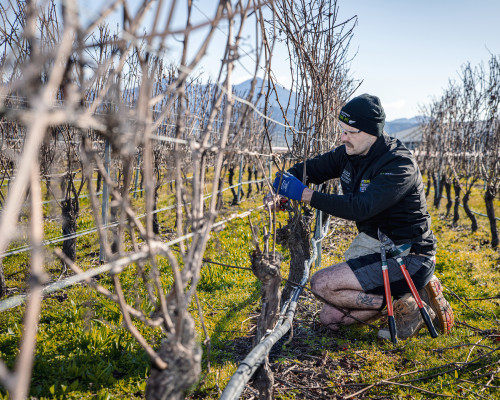Career change leads to awards in viticulture
4 October 2022
Tahryn Mason was a university student set for an academic career when a summer job at an Auckland vineyard prompted him to leave student life behind for what has become an award-winning career in viticulture.
Now a vineyard supervisor and the 2022 Young Viticulturalist of the Year, Tahryn is passionate about horticulture and encouraging others into the industry.
“I love the variety of my work. I love the application of science and the fine-tuning that goes into creating a quality product.”

Image credit: Richard Briggs | New Zealand Wine
Tahryn was studying history and philosophy at university in Auckland when he took a casual job at Villa Maria’s Auckland vineyard working with grapevine netting. He enjoyed it so much he left university and joined the vineyard full time in 2016.
“It is a great area to work in. You get to work outside and connect with nature, and you can learn so much.”
The vineyard produced a range of white wines, with a focus on Chardonnay. Because it was small, at 10 hectares, and producing single vineyard grapes, Tahryn says he was exposed to “the fine arts of wine making” quickly.
Learning on the job brings rewards
He soon signed up to learn more through the Primary ITO, completing the National Certificate in Horticulture (Introductory) Level 2 and Level 3 in his first two years. He then advanced to completing two Level 4 programmes, the National Certificate in Horticulture (Viticulture), and New Zealand Apprenticeship in Horticulture (Advanced).

Image credit: Richard Briggs | New Zealand Wine
After completing his apprenticeship Tahryn moved to a role at Villa Maria’s extensive Marlborough vineyard where he works in a small team responsible for 112 hectares of vines. The focus is on increasing efficiency and productivity while maintaining quality standards.
He says the operational focus of the study is particularly useful for a large commercial vineyard setting.
Tahryn says learning with Primary ITO has given him a good base knowledge, grown his thinking and prepared him to extend himself even further.
“My goal is to get involved in organics and managing soil health and nutrients. Vine health is often managed with a reactive approach but there are opportunities to use a more proactive approach and manage these areas from the front end for example.”
Career opportunities in horticulture
Tahryn is also passionate about encouraging others into the industry who might not be aware of the career opportunities available, particularly at a time when there is a skills shortage.
“A degree and university study is not for everyone. This is a great trade to work in and there are so many opportunities.”
He says an advantage of the Primary ITO programme is that it offers learning in the field. “That is where you can really learn and apply the skills practically. The apprenticeship probably prepares you better than a degree for the operational work we do.”
Tahryn says the apprenticeship was also broad enough to apply across all horticulture industries and he would encourage anyone making decisions on their future career or looking at a career change to give horticulture a try.
To learn more about viticulture and wine growing training programmes click here.
